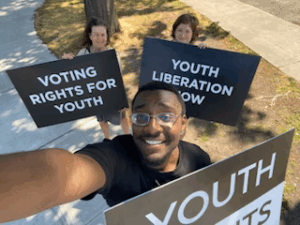
We talk a lot about how a great deal of anti-youth sentiment comes from the idea that those under 18 aren’t so much people as they are humanoid extensions of their parents. It’s boggling to think about just how deeply this affects a young person, how damaging this really is.
Guidance counselors and the like go on about how teens need to believe in themselves, to be themselves, to celebrate their uniqueness. These words are never so meaningless as they are with teens, not due to any inherent deficiency in teens, but because they have been taught their entire lives that they have no real selves to be!
This takes a wide variety of forms, but it comes down to one basic thing: that a young person’s life is whatever the adults around her decide it is, that she has no real say in it, that she doesn’t have the ability to have a say in it and no one cares if she does, that everything and anything she thinks and feels is wrong if it is contrary or even independent of what the adults think and feel.
Again, we all know this, on an intellectual level anyway. But why must this be? Why do our parents and other elders get to lay claim to our very identities when we’re young (and occasionally as long as they can)?
One example of this is parents deciding for you what religion you are, mapping out your progression through their congregation’s traditions, leaving no room for and overt discouragement of choosing not to do this, even deciding for you what your specific theological beliefs are. Because that’s what their own specific theological beliefs are and of course yours would be the exact same since you’re their kid, right? And you may even go along with this, perhaps not even bothering to come up with your own theological beliefs in all this, because that’s not as important as the fact that acquiescing to your parents’ expectations makes them happy and thus likely keeps your home life happy. What is there to gain by disagreeing?
That’s one example. A popular and extreme example of this is Amy Chua, who proudly denied her daughters any interests even slightly outside of what she determined for them. They could only play the instruments she wanted them to play. They could only associate with people she wanted them to associate with. They could only think or speak in a way she wanted them to. They could only have future goals that she decided for them. Chua built the life structure for them, and their only duty was to go through these predetermined motions whether they like it or not. This begs an important question: what kind of a life is that? If you can even call that a life.
While most families aren’t Chua-extreme, still most families prize children’s obedience and compliance above all else, that the worst things they can do in their young lives is disobey or disappoint their parents, whether because they will be shunned or lose privileges or be harshly disciplined or whatever else. Only through being obedient, quiet, docile, and unquestioning can children hope to have happy successful lives, right? That’s certainly what gets drilled into our heads at that age, and still being fairly new to the world, we don’t have much reason to think otherwise for the most part.
And this is what brings youth development to slow slow crawl, if not a screeching halt.
If a world outside the school and the family home, physically and/or intellectually, is closed off to you, whether because that outside world does not want you because you are not old enough for them to consider you a real person, or because the world you do know will shame and punish you for daring to test that boundary, or both, what room is there for a young person (or anyone for that matter) to grow, to develop that all-important sense of self, the source of all confidence and dreams and ideas? What damage is done, to whatever degree, when someone’s development of self is so delayed?
That varies from person to person, but often it can just end up delaying itself further. You go through 18 years of life, give or take, of your entire identity as a person being your parent’s child, as opposed to just being you. You become an adult and then to succeed, against everything you’ve always been told, you have to be you, not your parent’s child. And you don’t know how to be you or at least to be you confidently because you’ve never been permitted to be you, at least not without altercation. And you realize there is no you, or not much of one. Nearly two decades of supposed life, yet still there is no you. Why the hell not?
So then there are more years ahead of figuring out just who you are, now that you finally have the freedoms that in a more just world you should have already had, many shaky uncertain years as expected of someone so systematically denied any real personal identity. You’ve never been free to allow yourself to flourish before, to discover, and in many cases, it may be too late, you’ve taught yourself not to flourish, and a development of confident identity, of individual self, never truly happens. If you ask me, that is a real tragedy.
Alright, I’m being a little dramatic here, I know. Everyone is different and all families are different, therefore there are very different outcomes to these different forms of stifling youth development of self. It should never be assumed any particular young person is necessarily suffering from this, as many successfully resist it and it does no good to treat them like they haven’t.
But many of the ways parents and others are encouraged to treat young people is to control and coerce them, to censor and shield them, to “mold” them a certain way. This all amounts to denying youth their own selves, that their parents’ plans and intentions are what is really important. When denied the simple right to speak your mind, wear what you choose, be private when you wish to be, associate with those of your choosing, take up activities you wish, learn about what interests you, and a myriad of other simple liberties those of us older couldn’t imagine being without, what impression does a person get other than that she is not her own person and is instead someone else’s property and burden, that this state of being property is the be-all and end-all of her life (despite the far off idea that this situation will eventually end, technically)?
The oppression of youth traps people, impedes people, sometimes permanently. And we’re here to fight these restrictions and at long last set these individual people, these individual selves, free!






So what can parents do to encourage their children to find themselves and grow and develop as successful individuals?
Hello there, I found your web site via Google while searching for a related topic, your site came up, it looks great. I’ve bookmarked it in my google bookmarks.